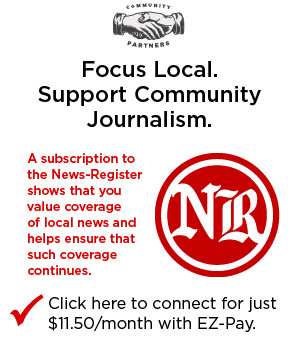Back, and Forth: Telling Middle East story takes may voices, views
Two weeks ago, I wrote about the Israel-Gaza situation. I cited schools that enroll a mix of Jewish and Arab students as something that might inspire hope in the otherwise bleak and tragic landscape around the eastern end of the Mediterranean Sea.
Last week, in a talk here in McMinnville, I gained new insight into similar elements of cross-cultural cooperation. Speaker Dr. Moustafa Bayoumi described the East-Western Divan orchestra, founded by the conductor Daniel Barenboim with the late Edward Said, renowned Middle Eastern scholar and critic in addition to being a concert-level pianist.
Bayoumi spoke Oct. 26 as part of Linfield University’s NW Media Fest, reaching an audience of about 60 in Nicholson Library. He said he came to talk “about narratives, about stories.”
“We live in a multi-cultural, multi-ethnic United States, and an important way to recognize this multiplicity is to celebrate our diversity.
“The idea that the United States is only one story, say, pilgrims to settlers to British subjects to independent citizens, is something almost no one believes in. What about the story of the indigenous people, those who are enslaved, what about those who were brought here to build our national infrastructure?”
He mentioned a quote that has been cited many times, from writer John Berger, “Never again will a single story be told as though it is the only one.” Berger continued, “There can never be a single story. There are only ways of seeing.”
“Understanding that stories that make up any group are multiple becomes a way of defeating the singular truncheon of stereotypes and presumably in a national setting by having us more credibly accept our differences,” said Bayoumi, a prolific author on American and Middle Eastern politics.
A professor of English at Brooklyn College, City University of New York, his works have appeared in The New York Times, The Nation and CNN.com, among others. He also serves as a columnist for The Guardian
He spoke affectionately and powerfully of Said, a Jerusalem-born Christian educated in the United States, who went on to establish himself as a preeminent observer of the region, its people and its conflicts.
Best known for his work “Orientalism,” Said was, in Bayoumi’s words, “a very important thinker in the United States who was able to articulate the ways in which knowledge and power have worked together in the act of imperialism, the key takeaway from orientalism.”
Near the end of his life, Said started the orchestra with maestro Barenboim, a Jew, bringing Arabs and Israelis to the same pages of music.
“It was very important to him as a way of fostering dialogue and coexistence,” Bayoumi said. “He did believe in those notions, but as he got older he got more radical.”
“He wrote copious amounts about how he disagreed with the Islamist politics in the entire region,” Bayoumi said, “and of course, was in vehement opposition to Israeli colonization of Palestinian lands.
“He would be crying from the rooftops for people to see that the dispossession of Palestine started in 1948 and it is literally continuing in front of our eyes. And we are literally enabling it by not doing anything about it.
“Our leadership is completely bankrupt, locally, and by doing so, they are threatening the foundations of their own societies. And I think he’s right.”
Bayoumi stated, “The act of interpretation is the act of questioning what makes something socially acceptable. And if that acceptance is premised on the denial of another’s freedom, that’s the question we have to ask.
“Otherwise, your story can be used by something other than what you want. And once others are in charge of telling your own story, your very own story can be used even to oppress you.”
Bayoumi, who regularly interjected “as I see it” and “I think” into his interpretations, said “Stories are what make us human. Everyone has a story. … And in an ideal world our stories would be shared with each other with equal interest and with mutual exchange.
“But it doesn’t happen that way. Because some stories are always elevated over other stories, the act of storytelling, or getting your story heard, (or of getting someone else’s suppressed) becomes an act of power and maybe even a search for justice. Storytelling is political. In fact it may be the first political act humans ever engaged in.”
Bayoumi’s original intent with his Linfield talk was as a Muslim-American who has come to a critical assessment of what he describes as worrisome co-opting of “the Muslim-American story” by conservative Christian and far-right groups and individuals. And then Gaza happened.
“I started writing this talk a few weeks ago and then, like, stuff happened, as they say,” he said. “It’s changed a little bit from how I expected it to, because politics have changed very quickly in the past few weeks.
He described attempts to sync the American Muslim-American voice with arch-conservative values such as those purveyed by Lt. Gen. Michael Flynn and former Fox News personality Tucker Carlson. He said Muslim-Americans have traditionally held centrist or liberal views, but are being strongly courted by conservatives of late.
“What’s most troubling about this turn of events is that these Muslim Americans who are enamored with the GOP don’t realize or are willfully ignoring that this same GOP has other agendas that directly conflict with the welfare of Muslim Americans,” Bayoumi said.
“This is what happens when you try to sell, instead of share, your narrative, and here it means to the lowest bidder.
“These Muslim-Americans seem to believe that by allying themselves with Christian conservatives, they will indeed have a seat at the table. Instead, they are probably just the appetizer course.”
Bayoumi concluded, “Only with interpretation can we start to think about the politics of stories, to think about them not as commodities, but as work. Our stories do things, and those things can sometimes lead to oppression, sometimes to liberation, and sometimes indeed to both at the same time.”
Contact Kirby Neumann-Rea at kirby@newsregister.com or 503-687-1291.
Clarification: This column should have included mention that the talk by Dr. Moustafa Bayoumi at Linfield University was the Erickson Lecture sponsored by the Department of English.












Comments